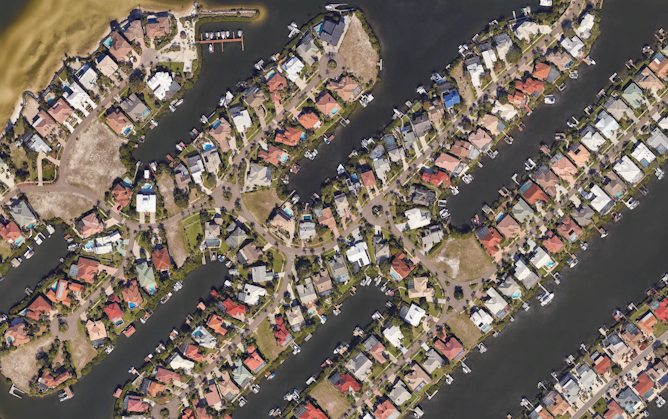|
It’s easy for coastal homebuyers to look up a property’s future flood risk – the rating is right there on the real estate listing. Near the water, the risk is often a 9 out of 10, or worse. But that isn’t stopping demand.
In Florida, houses near the water are still snapped up within days, even though many won’t outlast their 30-year mortgages without damage or expensive adaptations as sea level rises, write Risa Palm and Toby Bolsen.
The two Georgia State University scholars follow the coastal real estate market and the impact that climate change is having. Their latest survey shines a light on some of the problem: Nothing is forcing buyers to consider the long-term risks. And taxpayers shoulder part of the cost.
Also today:
|

|
Stacy Morford
Environment + Climate Editor
|
|

Apollo Beach, Fla., averages 3 feet above sea level, with many homes directly on the water.
Google Earth
Risa Palm, Georgia State University; Toby W. Bolsen, Georgia State University
Two professors asked hundreds of Florida real estate agents what they're seeing in the market and hearing from homebuyers.
|
Politics + Society
|
-
Frederick Gooding, Jr., Texas Christian University
Despite efforts to diversify the film industry, the Oscars awards ceremony demonstrates how far Hollywood has come – and how far it still has to go.
-
Miliann Kang, UMass Amherst; C.N. Le, UMass Amherst
Asian American mothers face a caregiving crisis, fueled by the pandemic but rooted in histories of anti-Asian discrimination and violence.
-
Aggie Yellow Horse, Arizona State University
When the Census Bureau’s count of the population is inaccurate, it affects representation and government spending. Correcting errors isn’t always allowed.
|
|
Environment + Energy
|
-
Jessica Barnes, University of South Carolina
Viewed from Cairo, the war in Ukraine poses an existential threat to something Egyptians can’t do without: abundant, cheap bread.
|
|
Health + Medicine
|
-
Catherine Ettman, Boston University; Sandro Galea, Boston University
Adults in the US reported the same levels of depression a year into the pandemic as they did at the outset.
-
Elizabeth Chiarello, Saint Louis University
After battling drug manufacturers and distributors in court for years, local and state governments are about to receive a windfall that could expand access to treatments that can save lives.
|
|
Ethics + Religion
|
-
Kathryn David, Vanderbilt University
Religion plays an important role in expansive views of Russian nationhood. But faith has played a role in Ukrainian nationalism, too.
|
|
Science + Technology
|
-
Yue Leng, University of California, San Francisco
While longer naps are a normal part of aging, excessively long dozes could be a warning signal for cognitive decline.
|
|
Arts + Culture
|
-
David L. Pike, American University
The end is often envisioned the same way: abruptly, hopelessly and completely. How does this constrain the range of possible solutions?
|
|
Podcast 🎙️
|
-
Gemma Ware, The Conversation; Clea Chakraverty, The Conversation France; Daniel Merino, The Conversation
Plus, the long history of humanity’s love of bees. Listen to The Conversation Weekly podcast.
|
|
From our international editions
|
|
|
|
The Conversation Quiz 🧠 |
|---|
| | More from The Conversation US |
|---|
|
|
|
| |
| |
| |
| |
|
|